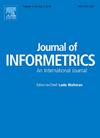From communicative to cultural memory: The role of collaboration in the diffusion of scientific innovation
IF 3.5
2区 管理学
Q2 COMPUTER SCIENCE, INTERDISCIPLINARY APPLICATIONS
引用次数: 0
Abstract
By integrating theories of collective memory and innovation diffusion, we construct a citation-based scientific innovation collective memory network and define four types of authors: Original authors, Adopters, Collaborators, and Converters. Additionally, we introduce two new quantitative metrics—the Adopter Conversion Rate (CRA) and Author Conversion Rate (CRC)—to assess the role of collaboration in the diffusion of scientific innovations. Using datasets from APS, Medline, and DBLP, we selected the top 100 most-cited papers published over 20 years ago as our research samples. Through a comprehensive analysis of citation patterns, scientific collaboration networks, and conversion rates, we uncover the pathways and mechanisms of knowledge diffusion in the scientific community. Our findings reveal that scientific research collaboration not only accelerates the diffusion of scientific innovations from their inception but also, as trust-based relationships develop and strengthen, facilitates efficient knowledge sharing and the growth of innovative activities. Furthermore, collaboration facilitates the transition from communicative memory to cultural memory, ensuring the long-term preservation and transmission of scientific knowledge.
从交际到文化记忆:合作在科学创新传播中的作用
通过整合集体记忆和创新扩散理论,构建了基于引文的科学创新集体记忆网络,并定义了原作者、采用者、合作者和转换者四种类型的作者。此外,我们引入了两个新的量化指标——采用者转化率(CRA)和作者转化率(CRC)——来评估合作在科学创新传播中的作用。使用APS、Medline和DBLP的数据集,我们选择了20多年前发表的被引用次数最多的前100篇论文作为我们的研究样本。通过对引文模式、科学合作网络和转化率的综合分析,揭示了科学社区知识传播的途径和机制。我们的研究结果表明,科研合作不仅从一开始就加速了科学创新的扩散,而且随着基于信任的关系的发展和加强,促进了有效的知识共享和创新活动的增长。此外,合作促进了从交际记忆到文化记忆的过渡,确保了科学知识的长期保存和传播。
本文章由计算机程序翻译,如有差异,请以英文原文为准。
求助全文
约1分钟内获得全文
求助全文
来源期刊

Journal of Informetrics
Social Sciences-Library and Information Sciences
CiteScore
6.40
自引率
16.20%
发文量
95
期刊介绍:
Journal of Informetrics (JOI) publishes rigorous high-quality research on quantitative aspects of information science. The main focus of the journal is on topics in bibliometrics, scientometrics, webometrics, patentometrics, altmetrics and research evaluation. Contributions studying informetric problems using methods from other quantitative fields, such as mathematics, statistics, computer science, economics and econometrics, and network science, are especially encouraged. JOI publishes both theoretical and empirical work. In general, case studies, for instance a bibliometric analysis focusing on a specific research field or a specific country, are not considered suitable for publication in JOI, unless they contain innovative methodological elements.
 求助内容:
求助内容: 应助结果提醒方式:
应助结果提醒方式:


